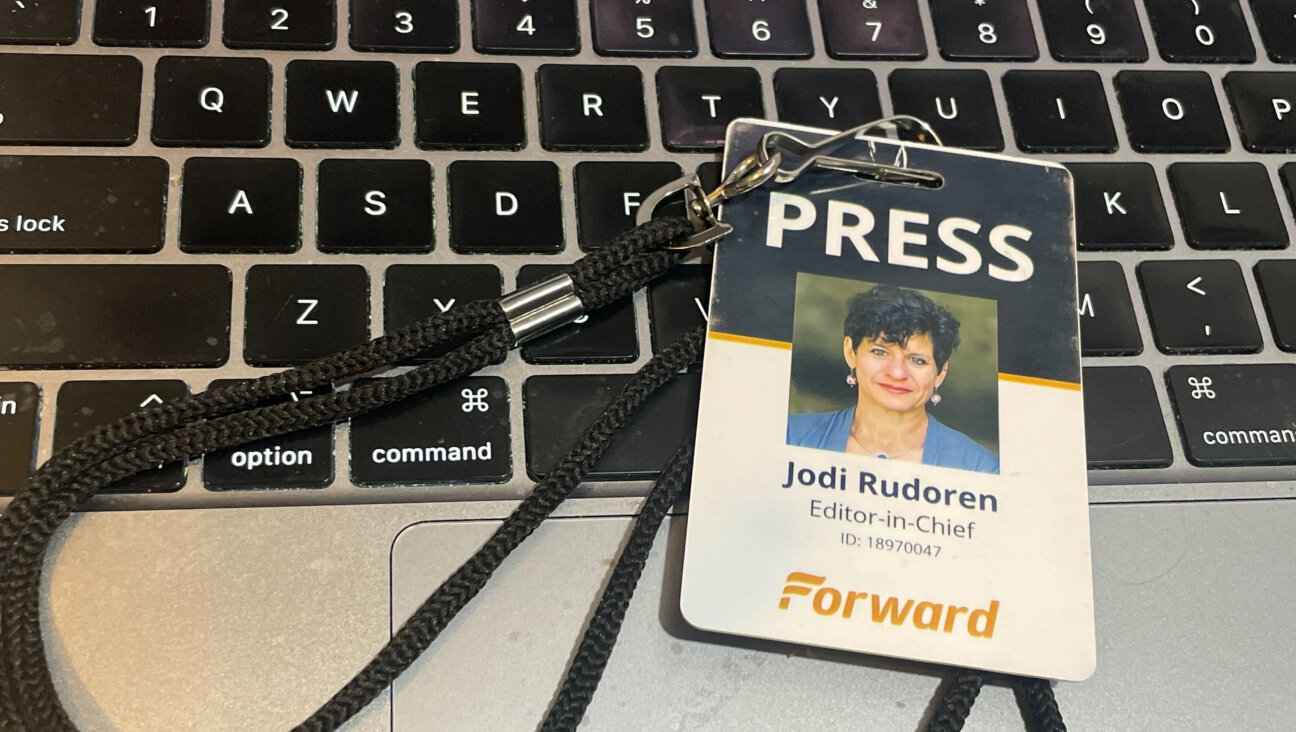Why I made cookies for Purim despite — actually, because of — the war
Using some of their favorite recipes, our Forward editor-in-chief made 134 cookies for the 134 Israeli hostages still in Gaza

This is what 134 cookies looks like. Courtesy of Jodi Rudoren
David Konio, 33, is an identical twin and the father of identical twins. His favorite cookies are Snow White Balls, made of rich dark chocolate with a dash of liqueur and rolled in two types of sugar before baking.
Tamir Nimrodi, 19, is a trivia buff who loves to cook — and eat. Especially oatmeal cookies with white chocolate chips and Craisins.
Matan Zangauker’s friends nicknamed him “Spider” because he is so terrified of the eight-legged creatures. He is 24, and loves Abadis, the Middle Eastern savory sesame rings that are more cracker than cookie.
They are three of the 134 hostages abducted by Hamas on Oct. 7 who remain in Gaza. Yesterday, I made their cookies, to give to my friends for Purim on Sunday, and honestly, I’m not sure how I feel about it.
I once saw a sign in an ice-cream shop that said: “Money can’t buy happiness, but ice cream helps.” I know baking cookies won’t actually help free the hostages — never mind end this horrible war and the near-famine gripping Gaza. Still, I suppose that sign hints at why I joined this Israeli social-media campaign to make and share the captives’ favorite cookies to fulfill the mitzvah of Mishloach Manot this Purim.
Mishloach Manot is Hebrew for “sending portions,” and is mentioned in the ninth chapter of the Book of Esther as one of the ways the ancient Jews of Persia made the 14th of Adar a holiday “of gladness and feasting” after thwarting Haman’s evil plan to annihilate them. It’s one of four core commandments for Purim, along with reading the megillah, having a feast and giving gifts to the poor.
We’re meant to send at least two food items to at least one person. But ours is not a minimalist tradition.
And so it has come to pass that in some corners of 21st century Jewish America, many bountiful and beautiful baskets of Purim treats are traded among the hoi polloi. Some are homemade and some are bulk-ordered from the internet. They generally center around the dry and not-delicious tri-cornered pastry known as Hamantashen, and thus are often too much of a not-very=good-thing.
My mother, woman of valor, was an early pioneer in addressing this very #FirstWorldProblem. Rather than have everyone in our shul community criss-cross the neighborhood trading saggy cellophane-wrapped paper plates, she devised a fundraiser in which people paid to sign their names onto collective — and beautifully curated — gift baskets.
The more people who put your name on their list, the bigger the basket you’d receive — and the more money the shul would collect. Over 35 years, Mom raised more than $1 million for the synagogue solely through Mishloach Manot.
She would spend months scouting for special treats to put in the deluxe baskets: fine wines, cheeses and chocolates, plus customized tchotchkes (our home is littered with corkscrews, pens, pads, keychains and the like that say “Happy Purim from Congregation Shaarei Tefillah”). Then she’d spend weeks painstakingly constructing routes for the dozens of volunteer drivers who did the deliveries (yes, there’s an app for that now). To this day, Mom can tell you the exact address for many hundreds of Jews who live in and around Newton, Massachusetts, and whether there are any one-way streets nearby.

So while I really do not like to make or eat Hamantashen, Mishloach Manot have a special place in my heart. Which is why this hostage-cookie campaign, called Tastes Like Home, caught my attention.
It is the brainchild of Shir Uziel, a 26-year-old web designer for an Israeli company called Zing Media. She lives in Yokneam, a village of about 1,400 people near Haifa, and is the daughter of a pastry chef. Hence: cookies.
“The main goal is to put faces and names to the number,” Uziel told our editorial fellow, Odeya Rosenband. “We have 134 hostages. We think of them and pray for them, but they aren’t people to us. Their favorite cookie is something so innocent.”
And so she invited hostage families to share their loved one’s favorite cookie recipe, along with a brief biography. There are 42 recipes — and stories — on the site so far, including seven for chocolate-chip cookies, and one for American-style pancakes. Some well-known foodies — Adi Shilon, a Berlin-based Israeli food blogger; Sharon Heinrich, a culinary tour guide in Paris; and Keren Agam, whose 297,000 followers include Gal Gadot — helped by testing and sharing the recipes.
“I think a lot of people felt helpless like I did,” Uziel said. “It’s so hard for me that I don’t even know most of the hostages’ names. I wanted to be able to share their stories and ideas and lives and dreams with everyone.”
I picked six. Of course I made Uriel Baruch’s coconut-covered chocolate balls, since he is the hostage whose card I have been carrying around with me for months, whose birthday I share, whose family I spent the first night of Hanukkah with.
Beyond that, though, I decided to skip the people I know the most about, like Hersh Goldberg-Polin and the Bibas family, and instead learn some new names and faces and stories. I also wanted to make things I don’t usually make, because this wartime Purim is unlike any other.
So, along with Zangauker’s Abadis, I picked Alfajores, a sandwich-cookie filled with dulce de leche and beloved by Eitan and Iain Horn, brothers who made aliyah from Argentina more than 20 years ago. On Oct. 7, Eitan, who is 37, was visiting Iair, 45, on Kibbutz Nir Oz, where he was in charge of the community pub.
I also made weird, flourless peanut butter cookies for Omer Nautra, a 22-year-old who grew up on Long Island and was serving in the IDF’s armored corps when he was kidnapped.
I made sure to read their stories before I started measuring the ingredients. But it made me a little uncomfortable, a feeling I also had during Friday night services last week, when our student rabbi read a lengthy biography of one of the captives. Because as little as we know about the 134 Hamas hostages, we know even less about the thousands of Palestinian civilians killed so far in Gaza, and the many thousands more who are on the brink of starvation.
How can I even think of cookies when people there are baking bread from birdseed?
I decided to donate the same amount I spent on ingredients to World Central Kitchen’s relief effort in Gaza.
Rabbi Elyse Wechtermann published a prescient essay a few years ago about how Purim, like the Israeli-Palestinian conflict, is essentially a situation of dueling narratives. First, Haman tells the king a one-sided story about the Jews. Then Esther shares the other side.
Our struggle is to hold both together. The horror of what happened on Oct. 7 and every bit of suffering since.






















